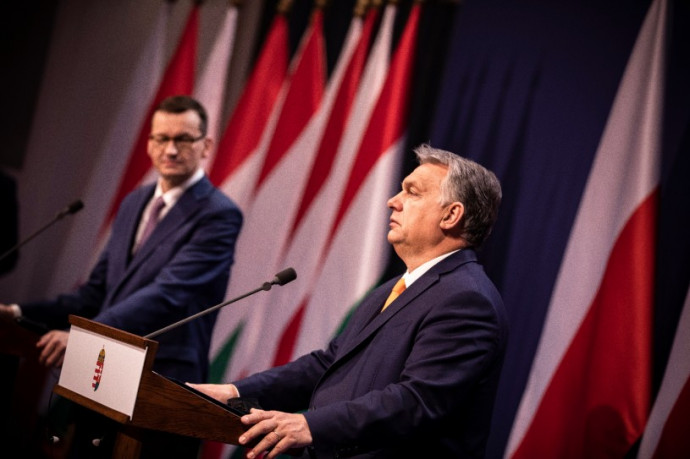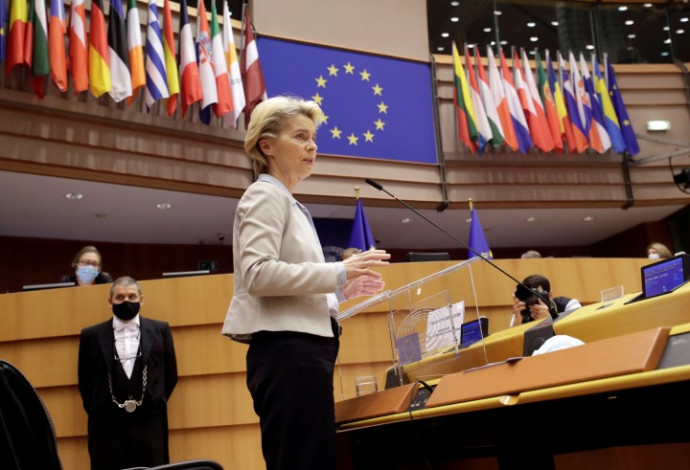Poland and Hungary insist on vetoing the rule of law mechanism

The Hungarian and Polish governments are not willing to back down concerning the rule of law mechanism – Mateusz Morawiecki demands changes to the draft regulation, while Viktor Orbán wants the entire procedure to be unlinked from the EU budget and the COVID-19 crisis fund, they told the press after their meeting on Thursday afternoon.
"It's good to meet the Polish whether things are up or down. Currently, we are somewhere in between," Viktor Orbán said after meeting Polish Prime Minister Mateusz Morawiecki, revealing that the main topic of their talks was the protection of their nations' sovereignty.
This "cheerful and beautiful topic," as Orbán put it, is overshadowed by the debate that is between EU institutions and a majority of the member states, and the Polish and Hungarian governments. There was plenty of time to settle disagreements since the budget agreement was made at the EU summit this summer, yet that was unsuccessful, and the majority of the EU is now trying to force something through that Poland and Hungary simply cannot accept, Orbán opined, summing it up as:
"We had to assess that creating this accord had failed, as they are still trying to link payments to rule of law questions, which is, in its substance, unacceptable for Hungary."
Hungary and Poland will be issuing a statement on the debate, with the two countries joining forces and coordinating their arguments. Hungary will not accept a plan that is unacceptable for Poland, the Hungarian PM said.
"A veto is a lawful tool. This is an option that is not only a possibility provided by EU law, it is also a legal obligation for me if I see Hungarian interests being hurt by EU decisionmaking."
The Prime Minister listed the main areas where there are disagreements with the majority of the EU, namely migration, sovereignty, and gender issues, which are independent of the budget or the handling of the crisis. He said that what is on the table is "not rule of law, but the rule of the majority," and he cannot allow the EU to force a decision onto Hungary that the country does not want, therefore, Hungary cannot be accused of hindering EU crisis response.

"This debate cannot be settled with money," he said, adding that the EU is not giving money to Hungary but dragging it into a joint loan, pushing the entire organisation into debt. This is "not a matter of necessity" for Hungary according to Orbán, but it is for other member states, yet they are setting "impossible criteria" for Hungary and Poland by tying together the multiannual financial framework, the COVID-19 recovery fund, and the rule of law mechanism.
"Hungary suffers no damage if the recovery fund fails to materialise. The Hungarian position is clear: The rule of law debate cannot be conflated with the recovery fund, as that results in political disagreements."
Orbán said that the solution is easy:
The financial stability of the European Union must be separated from rule of law questions.
So Orbán made it clear that the Hungarian government will refuse to lend support to any sort of rule of law mechanism, and
"We will fight alongside Poland in the upcoming months."
Mateusz Morawiecki described the rule of law mechanism as arbitrary, and concerns rule of law only in its name, while in actuality it is a budgetary tool, stating multiple times:
This is a bad solution which could possibly lead to the European Union falling apart.
The Polish PM thinks that the plans on rule of law conditionality are unacceptable as they violate the Treaties, the planned regulation places itself above them. Morawiecki claimed that contrary to the public discourse in Europe, it is the Hungarians and Polish who are trying to keep the European Union together by vetoing the rule of law mechanism, because it may be that right now Hungary and Poland are in the crosshairs, however, if the plan goes through, any other member state could be targeted at any time, as it could be a method of political attacks against countries, a tool – a stick – for perpetuating the constant debates creating tensions in the Union.
He said that for these two countries, the veto is unavoidable, unless the mechanism is changed by those who agreed to it in the first place, reiterating that by this veto, they are protecting the unity of the EU, the spirit of the Treaties, and the sovereignty of the member states. Morawiecki said:
"We are convinced that with our joint action, we can convince the rest of the member states about our position."
Last week, before the Polish-Hungarian summit, permanent representatives of these two countries to the EU had rejected the EU's 7-year budget over the rule of law mechanism. The informal votes happened at the Committee of Permanent Representatives, where 25 member states supported the package comprising the multiannual financial framework, the so-called Next Generation EU aid and loan package, but by blocking these, the Hungarian and Polish governments had thrown a spanner in the works for the third draft text, the regulation on the rule of law mechanism as well.

This caused a major stir in European politics as well. The European political family of Hungarian governing party Fidesz, the European People's Party is adamant on the matter, the Hungarian party's expulsion is still on the table, but as the group's press officer told Telex in our earlier interview, they are adamant on changing Orbán's mind on the rule of law conditionality. On Wednesday, President of the European Commission Ursula von der Leyen urged the quick adoption of the 7-year budget and the NextGen EU package, saying that member states who have doubts about the rule of law mechanism may turn to the European Court of Justice, adding:
"In July, all 27 Heads of State or Government agreed on a new conditionality mechanism for breaches of the principle of the rule of law that threaten the EU budget – and only for those breaches. It is appropriate, proportionate and necessary, and it is difficult to imagine anyone in Europe having a problem with that."
This requires no new legal acts, as this sort of judicial review is open concerning any sort of EU legislation. In his response to von der Leyen's words, Polish PM Morawiecki said on the same day that for EU legislation to be submitted for judicial review, it must first be ratified, but they "reject the adoption of legislation that would override the Treaties."
But adopting the rule of law mechanism requires no unanimous vote in the Council, formally speaking, a supermajority is enough for it to pass. On top of that, the opposition-controlled Polish Senate passed a resolution on Wednesday evening which calls on the Polish government to accept the EU budget agreement in its current form, as the Polish veto hurts the economic, political, and strategic interests of Poland – however, said resolution has no mandatory power over the government.
In Hungary, the situation is somewhat more straightforward, as Fidesz has a supermajority in the Parliament. The Hungarian National Assembly already passed a resolution during the summer, instructing a government to reject any sort of rule of law conditionality – although this is not legally binding either. Still, at summer's EU summit, Viktor Orbán also supported this agreement, and in the announcement of his political veto, he only urged that the Council's decision on rule of law shall be appealed against at the European Court of Justice. However, given that according to the Treaties, the Council's decisions can be taken before the EUCJ by default, this stands without any specific provisions to that effect in the regulation itself.
At last week's EU summit, this topic was hardly brought up; heads of states and governments had entrusted the current President of the Council, German Chancellor Angela Merkel, with finding a solution, so the next round of negotiations will take place between her, Morawiecki, and Orbán. The last word on this is expected at the EU Leaders' Summit on 10-11 December.